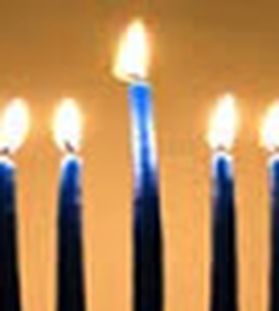"You're gonna have to serve somebody, On the day I was ordained by my rabbinic school, one of my teachers left me a note congratulating me on my new role in life, "To serve the servants of the Most High." The phrase has stayed with me as a sacred intention for my work. To be a rabbi is to be a servant. |
According to rabbinic tradition, the eight lower lights of the Chanukah menorah are holy. They may only be used for gazing upon them in remembrance of the miracle of Chanukah. The traditional formula recited after the candle lighting says, "We have no right to use them apart from looking at them."
The original purpose of the shamash was not to light the other candles. Rather, the shamash provides the ordinary light that can be used for ordinary purposes. When people read a book or walk across an otherwise darkened room by the light of the Chanukah menorah, we say that they are using the light of the shamash. The only holiness that belongs to the shamash comes from the way it allows the other candles to be holy.
Likewise, the holiness of a rabbi is only in his or her being useful for drawing out the holiness of others. A rabbi is a servant, not a holy figure to be venerated above others. Without a Jewish community to reflect the light of Torah, a rabbi would be just an ordinary candle.
People often look at rabbis as the people in the community who are supposed to be "in charge." After all, there they are in the most visible role, right in the middle of everything. But rabbis are just like that shamash—center-stage and high on a platform, but only as a servant to those who stand on either side. The men, women and children who come to learn, to pray, and to make a difference in the community are the real life of the congregation. They are the holy ones. The rabbi is just the conduit, the organizer, the vehicle.
Joseph, in this week's Torah portion (Miketz), is called upon to interpret two dreams for Pharaoh. Pharaoh says to him, "I have heard it said that for you to hear a dream is to tell its meaning." Joseph, however, understands the truth of his role. He says, "Not I! It is God who will see to Pharaoh’s welfare" (Genesis 41:15-16).
This is what rabbis do. Like Joseph, and like that tall candle in the middle, rabbis are best able to do their job by recognizing that it's not all about them. It's about the community; it's about the Torah; it's about God. It is about the flame the rabbi carries and those to whom the rabbi carries it.
Other Posts on This Topic:
The Blind and the Light
Ten Thoughts About Being a Congregational Rabbi
Miketz: Deception


 RSS Feed
RSS Feed
